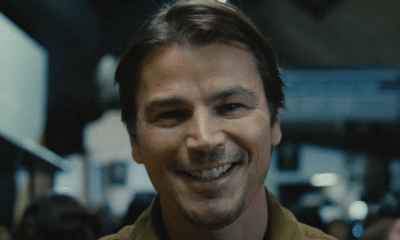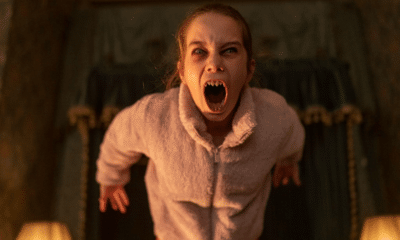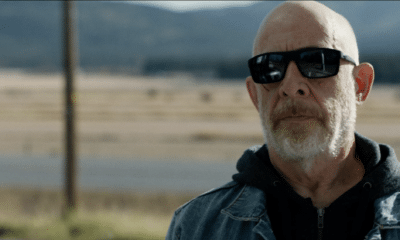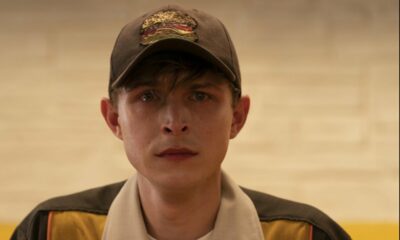
Curzon Artificial Eye
We’ve met Gloria before. In 2013, she lived in Santiago in Chile and was at the centre of director/writer Sebastián Lelio’s film about a middle-aged woman trying to find her place in the world. Fast forward to now, and she’s back, this time as Gloria Bell, living in New York, speaking English and played by Julianne Moore. But she still has much the same problems and it’s still the same director behind the camera.
She’s reached a turning point in her life. Divorced some years ago, her children are now grown up with lives of her own. She feels cut off from them, redundant even, and despite enjoying her office job, it’s simply not fulfilling enough. Evenings out at a local night club make a fun diversion and introduce some romance into her life, but it comes with strings attached.
This is only Lelio’s second film in English – his first was last year’s Disobedience – and he talks to THN’s Freda Cooper about the challenges of making a movie in a second language. He also describes his reasons for returning to this particular story, as well as the crucial part played by Julianne Moore in getting the project off the ground. And, while the film is essentially a remake, he also reflects on some of the differences between the original and this new version.

Image provided by Curzon Artificial Eye
Read the interview in full below.
The original of Gloria was released in 2013, so it’s not that old. How come you’re doing a remake so soon. I gather a certain Julianne Moore might have something to do with it?
Only because of her. This thing would not exist if it wasn’t for Julianne and my admiration for her.
So what part did she play in getting the film made?
The origins of Gloria Bell – there’s this misunderstanding. My manager called and said that Julianne had seen the film, the original film and love it and wanted to meet with me, but didn’t want to have anything to do with a remake. I was like, that makes sense because I wasn’t remaking my own film myself, so I was about to start shooting A Fantastic Woman and Disobedience back-to-back, so I was really into that. But of course, I was so flattered that Julianne wanted to meet with me.
You’re not going to turn it down.
No, I ‘ve always been a huge fan and admirer. I went to meet with her and I was very touched because she spoke so generously about the first Gloria. She had a deep understanding of the character and great passion, and I was like ‘wow,’ it’s so great. Then, at the end of the meeting I said thank you, it has been an honour to meet you and I totally get that you don’t want to remake [it]. She said, ‘no, what are you saying? I would only do it if you directed it’ Then, I immediately replied saying that ‘I would only do it if you are in it.’ And that was it. That’s the place where the film comes from – a place of admiration and enthusiasm and love for the story.
A mutual admiration by the sounds of it as well.
Yes, so that was really great as a beginning – a pure beginning, and then, of course, I was petrified and terrified of messing up with a story that had already worked, and the possibility of spoiling it was so …
It’s always the risk, isn’t it?
Yes, statistics aren’t on the side of remakes, you know what I mean? They aren’t so many happy examples, so I was like Woah, this is so dangerous and then that fear became precisely what made it really exciting, because it was such a challenge, you know? Such an artistic challenge to release those material and bring them back to life, and make them resonate again.
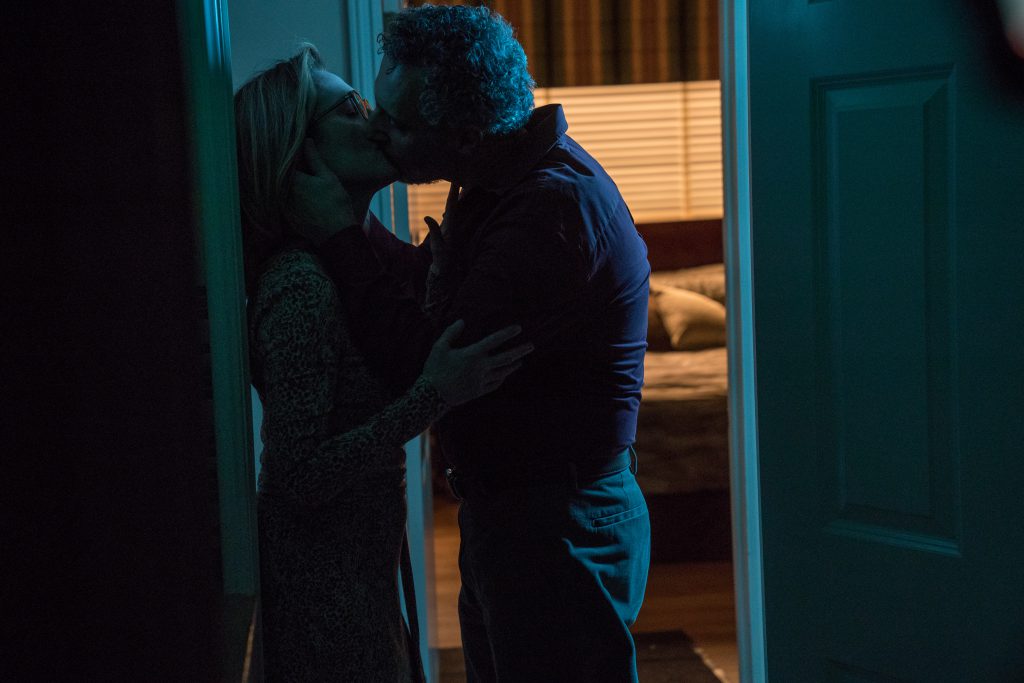
Curzon Artificial Eye
This is your second film in the English language, the first one was Disobedience. Does that mean you feel at home making films in English?
Well, I feel at home making films. That’s the thing.
They are a language in themselves, really?
They are, exactly. When making Disobedience, it was like the first day in college – what do I say? How does it work?
That was a very British setting as well.
It was, yeah. Then I realised it was the same thing – at the end of the day, it was about having the camera there, having the actors, and being always late [laughs].’ That felt really felt like being at home.
This isn’t a frame by frame remake – there are some definite differences in Gloria Bell compared to the original. The one I noticed, particularly, was the best friend, who is played by Rita Wilson – it’s a much bigger part in Gloria Bell than it is in Gloria. Why did you change that?
Well, I was trying to explore things that didn’t work in the first version and see if I could make the work in this new incarnation of the story. Yeah, something similar happens with the mother that didn’t exist in the first version. There are some differences, but it’s not about changing the story – that wasn’t the project – the project is about honouring the story but make it alive in a different moment of my life with a different set of actors – almost like a theatre play that is staged again. A different culture. It’s not about deforming the original text or, if it was a song, it’s not about changing the melody – it’s the same melody, played with a new rock band. That’s a melody that I like.

Curzon Artificial Eye
Talking about music, there’s plenty of that in the film in the scenes in the disco, and there are lots of scenes of Gloria singing along to music in the car, which is something we’ve all done. How do you go about choosing the songs that you used in the film? Were there any that you weren’t able to use?
Of course. When it comes to buying music it’s always a nightmare because they can charge you whatever they want, depending on what they had for breakfast. So, it’s like really random and it doesn’t have any logic, so I’, already well-trained in knowing that I have to be prepared to say goodbye to any idea. But what is challenging is to find a balance between what you’re getting because Gloria, and especially Gloria Bell, on top of all the songs, has an original score made by Matthew Herbert. It’s almost like a musical – it’s a hidden musical film. Every two or three minutes a new song comes in and it’s revealing aspects of the character’s process. Because of the lyrics, or because of the emotion of the music pieces, just like in a musical film. So, it’s crucial and it was great fun to find that playlist and what Gloria would listen to, and that was an interesting, long conversation that we had with Julianne. We were always exchanging ideas and she was helping me with understanding what the songs meant culturally in the States. Some things I might be missing because I don’t belong to the culture.
Of course, you had to keep the same song at the end?
Well, what is a brilliant synchronicity is that in the first Gloria we listened to the original song, played and composed by Umberto Tozzi. It’s an Italian pop masterpiece – Gloria. And in the second version, in Gloria Bell, we listen to Laura Branigan’s cover of Umberto Tozzi’s song. So everything is connected.

Curzon Artificial Eye
If you look back at your most recent films, obviously the original Gloria, A Fantastic Woman, Disobedience, you mentioned as well, and now Gloria Bell; they’ve all got women at the centre of them, women who stand apart from their group for one reason or another. Is that the appeal of their story or is it something bigger than that?
No, I think that makes sense. I tend to like that kind of character. The ones that are willing to pay the price to become who they are, to live, to really live. I like that. I admire that. I like these characters. I’m on their side, which doesn’t mean I will avoid showing dark aspects of them, but these are hopefully multi-dimensional portraits of them. They are so observed with such detail. I like to think that it’s not dissimilar to the level of intensity with you which you observe someone you love. You get to really know that person, the details of what is particular; how the hair falls, how they blink…
All the little idiosyncrasies.
Exactly. If you get to grasp that in a filmed portrait, I guess the feeling you offer to a spectator is one of great intimacy. You are watching someone with a gaze that is not too dissimilar to the one you have when you really know someone. Maybe that’s one of the reasons that these characters, in this case with Gloria and Gloria Bell, are capable of generating this strong bond between the spectator and the character.

Cyrzon Artificial Eye
You mention love and intimacy in there. There’s always an element of romance in there, even if it doesn’t work out – and it very rarely seems to. Does that mean you’re a bit of a romantic at heart?
Who knows? I will answer that question after I turn 70. Then I can use statistics.
We’ll make a date for that.
Okay.
I wondered what you though the film had to say about getting older, particularly if you’re a woman and the loneliness that can go with that. In both versions of Gloria, she’s divorced but she also feels very distant from her children as well, because they are grown up and they need her as much any more.
Yeah, but that’s life. We are all very busy with our own existences and it’s not that they don’t love her, it’s just that they are living their own lives on the same cycle we repeated when we became older. That’s how this thing is designed.
It’s almost as if she’s recreating herself or creating a whole new life for herself. Whether she wants to or not, actually.
Yes, well I think she’s really living with all the gifts that that carries with, but also with all the prices she has to pay. She’s really into life, and I think that’s remarkable.
Gloria Bell is released in cinemas and on-demand on Thursday, 6 June.

Latest Posts
-


Film Trailers
/ 22 hours agoM. Night Shyamalan’s ‘Trap’ trailer lands
Anew experience in the world of M. Night Shyamalan.
By Paul Heath -


Film News
/ 2 days agoFirst ‘Transformers One’ teaser trailer debuts IN SPACE!
The animated feature film is heading to cinemas this September.
By Paul Heath -


Film Reviews
/ 2 days ago‘Abigail’ review: Dirs. Matt Bettinelli-Olpin & Tyler Gillett (2024)
Matt Bettinelli-Olpin and Tyler Gillett direct this new horror/ heist hybrid.
By Awais Irfan -


Film Trailers
/ 2 days agoNew trailer for J.K. Simmons-led ‘You Can’t Run Forever’
A trailer has dropped for You Can’t Run Forever, a new thriller led by...
By Paul Heath
